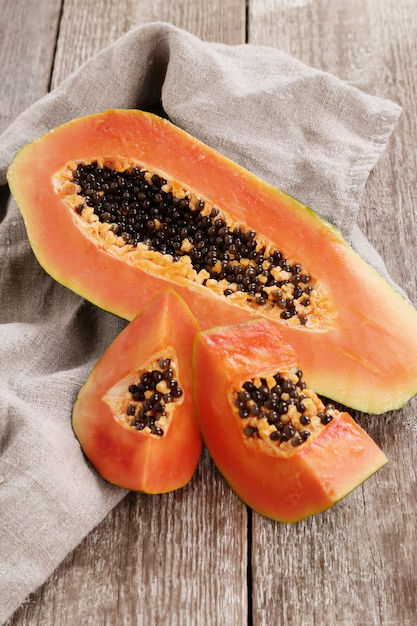
Papaya, scientifically known as Carica papaya, is a tropical fruit that not only delights the palate with its sweetness but also offers a multitude of health benefits. This article explores the nutritional composition of papaya and its various health advantages, supported by scientific research.
Nutritional Composition of Papaya
Papaya is a nutrient-rich fruit that can significantly enhance a balanced diet. A medium-sized papaya, weighing about 275 grams, typically contains:
- Calories: 119
- Protein: 1.3 grams
- Carbohydrates: 30 grams
- Dietary Fiber: 4.7 grams
- Sugars: 21.58 grams
- Fat: Less than 1 gram
In addition to these macronutrients, papaya is an excellent source of vitamins A and C, folate, potassium, magnesium, and antioxidants such as lycopene and beta-carotene.
Health Benefits of Papaya
1. Cardiovascular Health
Papaya is rich in antioxidants, particularly vitamins C and E, which help mitigate oxidative stress and inflammation—both significant contributors to heart disease. The fiber content in papaya aids in lowering cholesterol levels, further reducing cardiovascular risks. Lycopene, another antioxidant found in papaya, has been linked to a decreased risk of heart disease by preventing the oxidation of cholesterol.
2. Digestive Aid
The fruit contains enzymes like papain and chymopapain that facilitate protein digestion, making it beneficial for individuals with digestive issues. Its high fiber content promotes regular bowel movements and can alleviate constipation. Studies indicate that papaya may significantly improve symptoms of irritable bowel syndrome (IBS) and bloating.
3. Anti-Inflammatory Properties
The enzymes present in papaya exhibit anti-inflammatory effects that can help alleviate pain associated with conditions such as arthritis and asthma. Regular consumption may assist in managing chronic inflammation throughout the body.
4. Immune System Support
Rich in vitamin C, papaya enhances the immune system’s ability to fend off infections and illnesses. Additionally, vitamin A plays a crucial role in maintaining a healthy immune response.
5. Cancer Prevention Potential
Research suggests that the antioxidants in papaya, particularly lycopene and beta-carotene, may lower the risk of certain cancers by neutralizing free radicals that cause cellular damage. Some studies indicate that lycopene may slow tumor growth, especially in prostate cancer patients.
6. Vision Protection
Papaya contains zeaxanthin and carotenoids that protect against oxidative stress in the eyes and may help reduce the risk of age-related macular degeneration. The high vitamin A content also supports overall eye health.
7. Skin Health
The vitamins C and E found in papaya contribute to skin hydration and elasticity, potentially reducing signs of aging such as wrinkles. The fruit’s antioxidant properties can also help protect the skin from sun damage.
8. Weight Management
With its low calorie count and high water content (approximately 88%), papaya is an excellent choice for those looking to manage their weight. Its fiber content promotes satiety, helping curb overeating.
Conclusion
Incorporating papaya into your diet can provide a wide array of health benefits ranging from improved heart health to enhanced digestive function and potential cancer prevention. Its rich nutritional profile makes it a versatile fruit that can be enjoyed fresh, blended into smoothies, or added to salads. However, individuals with latex allergies should be cautious when consuming unripe papaya due to potential allergic reactions caused by latex present in the fruit. Overall, adding this nutrient-dense fruit to your meals can significantly enhance your overall health and well-being.







